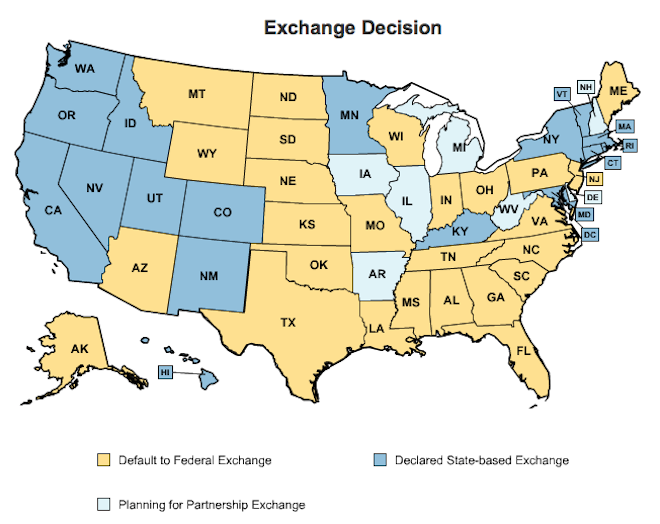A total of 26 Republican-led or Republican-leaning states have declined to establish insurance exchanges, a centerpiece of the reforms ushered in by the Affordable Care Act, ceding control of a critical element of their health care system to the federal government.
The ACA requires the creation of the one-stop marketplaces called exchanges to connect buyers and sellers of health insurance — the vehicle through which the law would expand coverage and protect consumers. The law encourages states to build their own exchanges under the guidelines. If they refuse, the federal government will take on the task.
By last Friday’s deadline, just 17 states and Washington, D.C., submitted their plans for exchanges. Just four of them are governed by Republicans — Idaho, Nevada, New Mexico and Utah. An additional seven states intend to build their exchanges in partnership with the federal government. The exchanges are scheduled to go live on Jan. 1, 2014.
Of the remaining 26, twenty-four have Republican governors. The other two, Montana and Missouri, have decidedly conservatives electorates and Republican-controlled legislatures.
Kaiser Health News has a chart of where the states stand:

The outcome is ironic. When the ACA created this structure, it seemed like a no-brainer that states would be on board. Why would any of them, especially the ones hostile to the law, willingly give up control of their health care systems to Washington?
Ironically the answer, by and large, is politics. Conservatives activists detest “Obamacare” and argue that any governor who agrees to build an exchange is abetting the law, even though the consequence of not doing to is to surrender more control to Washington. There is a substantive gripe, too: conservatives contend that the law offers too little flexibility for states to craft the exchanges in accordance with their needs.
Supporters of Obamacare are divided about the consequences of this outcome.
On one hand, the Department of Health and Human Services must now build exchanges for more than half the country — a daunting task that the law did not anticipate and failed to guarantee additional funding for. HHS must find the money within its budget.
On the other hand, liberals always wanted more federal control over the exchanges. The House-passed legislation authorized Washington to operate one national health insurance exchange for all 50 states, but the Senate changed that. Some progressives believe that residents of states reluctant to implement the law are better off under a federal exchange.
“Now, in an ironic way, some of what progressives wanted is going to happen. The national government will be setting the framework for at least half of the country,” Theda Skocpol, a professor at Harvard University and expert on health care politics and policy, said in an email Tuesday. “State-level experiments and variants will often have a more progressive flavor — in the states doing their own exchanges — and of course those may create models that could later spread. Meanwhile, the feds will at least create some consistency.”
The immediate political upshot for leaders of the Republican states that stonewalled the exchanges is that they’ll avoid the wrath of their conservative flanks. And in the long-run, this decision allows them to more easily blame the federal government if things go wrong.
“All of this has a political side, too, and the GOP states that are staying out are surely trying to situate their officials to cry blame against the national government every time any little glitch happens,” Skocpol said. “Many glitches will happen.”
Relative to other state-based obstacles to making the Affordable Care Act work, notably the Medicaid expansion, proponents don’t believe this outcome will scuttle the law.
“These dramas will play out over many months in many different ways,” Skocpol said. “What is for sure is that Obamacare will go forward. This situation will not upend it.”






